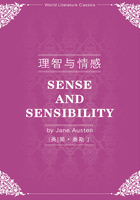Edward was not entirely without hopes of some favourable change in his mother towards him,and on that he rested for the residue of their income. But Elinor had no such dependence; for since Edward would still be unable to marry Miss Morton, and his choosing herself had been spoken of in Mrs. Ferrars's flattering language as only a lesser evil than his choosing Lucy Steele, she feared that Robert's offence would serve no other purpose than to enrich Fanny.
About four days after Edward's arrival, Colonel Brandon appeared, to complete Mrs. Dashwood's satisfaction, and to give her the dignity of having for the first time since her living at Barton more company with her than her house would hold. Edward was allowed to retain the privilege of first comer, and Colonel Brandon therefore walked every night to his old quarters at the park, from whence he usually returned in the morning early enough to interrupt the lovers’ first tête-à-tête before breakfast.
A three weeks’ residence at Delaford, where, in his evening hours at least, he had little to do but to calculate the disproportion between thirty-six and seventeen, brought him to Barton in a temper of mind which needed all the improvement in Marianne's looks, all the kindness of her welcome, and all the encouragement of her mother's language, to make it cheerful. Among such friends, however, and such flattery, he did revive. No rumour of Lucy's marriage had yet reached him; he knew nothing of what had passed; and the first hours of his visit were consequently spent in hearing and in wondering. Everything was explained to him by Mrs. Dashwood, and he found fresh reason to rejoice in what he had done for Mr. Ferrars, since eventually it promoted the interest of Elinor.
It would be needless to say that the gentlemen advanced in the good opinion of each other as they advanced in each other's acquaintance, for it could not be otherwise. Their resemblance in good principles and good sense, in disposition and manner of thinking, would probably have been sufficient to unite them in friendship without any other attraction;but their being in love with two sisters, and two sisters fond of each other, made that mutual regard inevitable and immediate which might otherwise have waited the effect of time and judgment.
The letters from town, which a few days before would have made every nerve in Elinor's body thrill with transport, now arrived to be read with less emotion than mirth. Mrs. Jennings wrote to tell the wonderful tale, to vent her honest indignation against the jilting girl, and pour forth her compassion towards poor Mr. Edward, who, she was sure, had quite doted upon the worthless hussy, and was now, by all accounts almost brokenhearted at Oxford.—"I do think," she continued," nothing was ever carried on so sly; for it was but two days before, Lucy called and sat a couple of hours with me. Not a soul suspected anything of the matter, not even Nancy, who, poor soul! came crying to me the day after in a great fright for fear of Mrs. Ferrars, as well as not knowing how to get to Plymouth; for Lucy, it seems, borrowed all her money before she went off to be married, on purpose we suppose to make a show with, and poor Nancy had not seven shillings in the world; so I was very glad to give her five guineas to take her down to Exeter, where she thinks of staying three or four weeks with Mrs. Burgess in hopes, as I tell her, to fall in with the Doctor again. And I must say that Lucy's crossness not to take her along with them in the chaise is worse than all. Poor Mr. Edward! I cannot get him out of my head, but you must send for him to Barton, and Miss Marianne must try to comfort him."
Mr. Dashwood's strains were more solemn. Mrs. Ferrars was the most unfortunate of women. Poor Fanny had suffered agonies of sensibility; and he considered the existence of each, under such a blow, with grateful wonder. Robert's offence was unpardonable, but Lucy's was infinitely worse. Neither of them was ever again to be mentioned to Mrs. Ferrars; and even if she might hereafter be induced to forgive her son, his wife should never be acknowledged as her daughter, nor be permitted to appear in her presence. The secrecy with which everything had been carried on between them was rationally treated as enormously heightening the crime because, had any suspicion of it occurred to the others, proper measures would have been taken to prevent the marriage;and he called on Elinor to join with him in regretting that Lucy's engagement with Edward had not rather been fulfilled than that she should thus be the means of spreading misery further in the family. He thus continued:
"Mrs. Ferrars has never yet mentioned Edward's name, which does not surprise us; but to our great astonishment, not a line has been received from him on the occasion. Perhaps, however, he is kept silent by his fear of offending, and I shall, therefore, give him a hint by a line to Oxford that his sister and I both think a letter of proper submission from him, addressed perhaps to Fanny, and by her shown to her mother, might not be taken amiss; for we all know the tenderness of Mrs. Ferrars's heart, and that she wishes for nothing so much as to be on good terms with her children."
This paragraph was of some importance to the prospects and conduct of Edward. It determined him to attempt a reconciliation, though not exactly in the manner pointed out by their brother and sister.
"A letter of proper submission!" repeated he; "would they have me beg my mother's pardon for Robert's ingratitude to her and breach of honour to me?I can make no submission.I am grown neither humble nor penitent by what has passed. I am grown very happy, but that would not interest.I know of no submission that is proper for me to make."
"You may certainly ask to be forgiven," said Elinor, "because you have offended;and I should think you might now venture so far as to profess some concern for having ever formed the engagement which drew on you your mother's anger."
He agreed that he might.
"And when she has forgiven you, perhaps a little humility may be convenient while acknowledging a second engagement almost as imprudent in her eyes as the first."
He had nothing to urge against it, but still resisted the idea of a letter of proper submission; and, therefore, to make it easier to him, as he declared a much greater willingness to make mean concessions by word of mouth than on paper, it was resolved that instead of writing to Fanny, he should go to London and personally entreat her good offices in his favour."And if they really do interest themselves,"said Marianne in her new character of candour, "in bringing about a reconciliation, I shall think that even John and Fanny are not entirely without merit."
After a visit on Colonel Brandon's side of only three or four days, the two gentlemen quitted Barton together. They were to go immediately to Delaford, that Edward might have some personal knowledge of his future home and assist his patron and friend in deciding on what improvements were needed to it; and from thence, after staying there a couple of nights, he was to proceed on his journey to town.
Chapter 14
AFTER A PROPER resistance on the part of Mrs. Ferrars, just so violent and so steady as to preserve her from that reproach which she always seemed fearful of incurring, the reproach of being too amiable, Edward was admitted to her presence and pronounced to be again her son.
Her family had of late been exceedingly fluctuating. For many years of her life she had had two sons; but the crime and annihilation of Edward a few weeks ago had robbed her of one; the similar annihilation of Robert had left her for a fortnight without any; and now, by the resuscitation of Edward, she had one again.
In spite of his being allowed once more to live, however, he did not feel the continuance of his existence secure till he had revealed his present engagement; for the publication of that circumstance, he feared, might give a sudden turn to his constitution and carry him off as rapidly as before. With apprehensive caution, therefore, it was revealed, and he was listened to with unexpected calmness. Mrs. Ferrars at first reasonably endeavoured to dissuade him from marrying Miss Dashwood by every argument in her power; told him that in Miss Morton he would have a woman of higher rank and larger fortune; and enforced the assertion by observing that Miss Morton was the daughter of a nobleman with thirty thousand pounds, while Miss Dashwood was only the daughter of a private gentleman with no more than three;but when she found that, though perfectly admitting the truth of her representation, he was by no means inclined to be guided by it, she judged it wisest from the experience of the past to submit; and therefore, after such an ungracious delay as she owed to her own dignity, and as served to prevent every suspicion of good will, she issued her decree of consent to the marriage of Edward and Elinor.
What she would engage to do towards augmenting their income was next to be considered; and here it plainly appeared that though Edward was now her only son, he was by no means her eldest; for while Robert was inevitably endowed with a thousand pounds a year, not the smallest objection was made against Edward's taking orders for the sake of two hundred and fifty at the utmost; nor was anything promised either for the present or in future beyond the ten thousand pounds, which had been given with Fanny.
It was as much, however, as was desired, and more than was expected by Edward and Elinor; and Mrs. Ferrars herself, by her shuffling excuses, seemed the only person surprised at her not giving more.
With an income quite sufficient to their wants thus secured to them, they had nothing to wait for after Edward was in possession of the living but the readiness of the house, to which Colonel Brandon, with an eager desire for the accommodation of Elinor, was making considerable improvements; and after waiting some time for their completion, after experiencing as usual a thousand disappointments and delays from the unaccountable dilatoriness of the workmen, Elinor, as usual, broke through the first positive resolution of not marrying till everything was ready, and the ceremony took place in Barton church early in the autumn.
The first month after their marriage was spent with their friend at the mansion-house, from whence they could superintend the progress of the parsonage and direct everything as they liked on the spot; could choose papers, project shrubberies, and invent a sweep. Mrs. Jennings's prophecies, though rather jumbled together, were chiefly fulfilled; for she was able to visit Edward and his wife in their parsonage by Michaelmas, and she found in Elinor and her husband, as she really believed, one of the happiest couples in the world. They had, in fact, nothing to wish for but the marriage of Colonel Brandon and Marianne, and rather better pasturage for their cows.
They were visited on their first settling by almost all their relations and friends. Mrs. Ferrars came to inspect the happiness which she was almost ashamed of having authorized; and even the Dashwoods were at the expense of a journey from Sussex to do them honour.
"I will not say that I am disappointed, my dear sister," said John as they were walking together one morning before the gates of Delaford House,"that would be saying too much,for certainly you have been one of the most fortunate young women in the world, as it is. But, I confess, it would give me great pleasure to call Colonel Brandon brother. His property here, his place, his house, everything in such respectable and excellent condition! And his woods! I have not seen such timber anywhere in Dorsetshire as there is now standing in Delaford Hanger! And though, perhaps, Marianne may not seem exactly the person to attract him, yet I think it would altogether be advisable for you to have them now frequently staying with you; for as Colonel Brandon seems a great deal at home, nobody can tell what may happen, for when people are much thrown together and see little of anybody else—and it will always be in your power to set her off to advantage, and so forth—in short, you may as well give her a chance. You understand me."
But though Mrs.Ferrars did come to see them,and always treated them with the make-believe of decent affection, they were never insulted by her real favour and preference.That was due to the folly of Robert and the cunning of his wife; and it was earned by them before many months had passed away. The selfish sagacity of the latter, which had at first drawn Robert into the scrape, was the principal instrument of his deliverance from it; for her respectful humility, assiduous attentions, and endless flatteries, as soon as the smallest opening was given for their exercise, reconciled Mrs. Ferrars to his choice, and re-established him completely in her favour.
The whole of Lucy's behaviour in the affair, and the prosperity which crowned it, therefore, may be held forth as a most encouraging instance of what an earnest, an unceasing attention to self-interest, however its progress may be apparently obstructed, will do in securing every advantage of fortune, with no other sacrifice than that of time and conscience. When Robert first sought her acquaintance and privately visited her in Bartlett's Buildings, it was only with the view imputed to him by his brother. He merely meant to persuade her to give up the engagement; and as there could be nothing to overcome but the affection of both, he naturally expected that one or two interviews would settle the matter. In that point, however, and that only, he erred; for though Lucy soon gave him hopes that his eloquence would convince her in time,another visit,another conversation,was always wanted to produce this conviction. Some doubts always lingered in her mind when they parted, which could only be removed by another half-hour's discourse with himself. His attendance was by this means secured, and the rest followed in course. Instead of talking of Edward, they came gradually to talk only of Robert, a subject on which he had always more to say than on any other, and in which she soon betrayed an interest even equal to his own; and, in short, it became speedily evident to both that he had entirely supplanted his brother. He was proud of his conquest, proud of tricking Edward, and very proud of marrying privately without his mother's consent. What immediately followed is known. They passed some months in great happiness at Dawlish; for she had many relations and old acquaintance to cut, and he drew several plans for magnificent cottages; and from thence returning to town, procured the forgiveness of Mrs. Ferrars by the simple expedient of asking it, which, at Lucy's instigation, was adopted. The forgiveness at first, indeed, as was reasonable, comprehended only Robert; and Lucy, who had owed his mother no duty and therefore could have transgressed none, still remained some weeks long unpardoned. But perseverance in humility of conduct and messages, in self-condemnation for Robert's offence, and gratitude for the unkindness she was treated with, procured her in time the haughty notice which overcame her by its graciousness, and led soon afterwards by rapid degrees to the highest state of affection and influence. Lucy became as necessary to Mrs. Ferrars as either Robert or Fanny; and while Edward was never cordially forgiven for having once intended to marry her, and Elinor, though superior to her in fortune and birth,was spoken of as an intruder,she was in everything considered, and always openly acknowledged, to be a favourite child. They settled in town, received very liberal assistance from Mrs. Ferrars, were on the best terms imaginable with the Dashwoods; and setting aside the jealousies and ill will continually subsisting between Fanny and Lucy, in which their husbands of course took a part, as well as the frequent domestic disagreements between Robert and Lucy themselves, nothing could exceed the harmony in which they all lived together.
What Edward had done to forfeit the right of eldest son might have puzzled many people to find out; and what Robert had done to succeed to it might have puzzled them still more. It was an arrangement, however, justified in its effects if not in its cause; for nothing ever appeared in Robert's style of living or of talking to give a suspicion of his regretting the extent of his income as either leaving his brother too little or bringing himself too much; and if Edward might be judged from the ready discharge of his duties in every particular, from an increasing attachment to his wife and his home, and from the regular cheerfulness of his spirits, he might be supposed no less contented with his lot, no less free from every wish of an exchange.
Elinor's marriage divided her as little from her family as could well be contrived without rendering the cottage at Barton entirely useless; for her mother and sisters spent much more than half their time with her. Mrs. Dashwood was acting on motives of policy as well as pleasure in the frequency of her visits at Delaford; for her wish of bringing Marianne and Colonel Brandon together was hardly less earnest, though rather more liberal, than what John had expressed. It was now her darling object. Precious as was the company of her daughter to her, she desired nothing so much as to give up its constant enjoyment to her valued friend; and to see Marianne settled at the mansion-house was equally the wish of Edward and Elinor. They each felt his sorrow and their own obligations, and Marianne, by general consent, was to be the reward of all.
With such a confederacy against her, with a knowledge so intimate of his goodness, with a conviction of his fond attachment to herself, which at last, though long after it was observable to everybody else, burst on her—what could she do?
Marianne Dashwood was born to an extraordinary fate. She was born to discover the falsehood of her own opinions, and to counteract by her conduct her most favourite maxims. She was born to overcome an affection formed so late in life as at seventeen, and with no sentiment superior to strong esteem and lively friendship, voluntarily to give her hand to another—and that other,a man who had suffered no less than herself under the event of a former attachment, whom, two years before, she had considered too old to be married, and who still sought the constitutional safeguard of a flannel waistcoat!
But so it was. Instead of falling a sacrifice to an irresistible passion, as once she had fondly flattered herself with expecting, instead of remaining even forever with her mother and finding her only pleasures in retirement and study, as afterwards in her more calm and sober judgment she had determined on, she found herself at nineteen submitting to new attachments, entering on new duties, placed in a new home, a wife, the mistress of a family, and the patroness of a village.
Colonel Brandon was now as happy as all those who best loved him believed he deserved to be; in Marianne he was consoled for every past affliction; her regard and her society restored his mind to animation and his spirits to cheerfulness; and that Marianne found her own happiness in forming his was equally the persuasion and delight of each observing friend. Marianne could never love by halves; and her whole heart became, in time, as much devoted to her husband as it had once been to Willoughby.
Willoughby could not hear of her marriage without a pang; and his punishment was soon afterwards complete in the voluntary forgiveness of Mrs. Smith, who, by stating his marriage with a woman of character as the source of her clemency, gave him reason for believing that had he behaved with honour towards Marianne, he might at once have been happy and rich. That his repentance of misconduct, which thus brought its own punishment, was sincere, need not be doubted; nor that he long thought of Colonel Brandon with envy and of Marianne with regret. But that he was forever inconsolable, that he fled from society, or contracted an habitual gloom of temper, or died of a broken heart, must not be depended on; for he did neither. He lived to exert, and frequently to enjoy himself. His wife was not always out of humour, nor his home always uncomfortable; and in his breed of horses and dogs, and in sporting of every kind, he found no inconsiderable degree of domestic felicity.
For Marianne, however, in spite of his incivility in surviving her loss—he always retained that decided regard which interested him in everything that befell her, and made her his secret standard of perfection in woman; and many a rising beauty would be slighted by him in after-days as bearing no comparison with Mrs. Brandon.
Mrs. Dashwood was prudent enough to remain at the cottage without attempting a removal to Delaford; and fortunately for Sir John and Mrs. Jennings, when Marianne was taken from them, Margaret had reached an age highly suitable for dancing and not very ineligible for being supposed to have a lover.
Between Barton and Delaford there was that constant communication which strong family affection would naturally dictate; and among the merits and the happiness of Elinor and Marianne, let it not be ranked as the least considerable, that though sisters, and living almost within sight of each other, they could live without disagreement between themselves, or producing coolness between their husbands.














